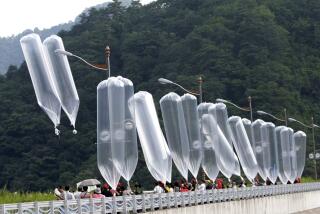Conditions in North Korea
- Share via
North Korea’s “declining ability to invade” (“N. Korea Crises Seen as Weakening Its Military,” Nov. 26) seems overly optimistic. Jim Mann’s earlier report (“Despite Woes, N. Korea Remains Threat,” July 29, 1997) of the CIA’s prediction that “because of its severe economic problems, North Korea was bound to change dramatically in one of three ways: It would collapse, go to war against South Korea or decide to reunify with the South” seems a more realistic guideline.
Regarding North Korea’s preparedness for invading the South, it could have, for example, slowly built up fuel supplies for its armor in the tunnels near the DMZ without being detected, even with fuel shortages. Let’s all hope that, instead of invasion, Pyongyang opts to reunify with the South.
MARTIN WILLINSKI
Northridge
*
Most Korean Americans, including myself, don’t like communism and the specter of communists taking over the entire Korean peninsula.
I believe, however, that it is absurd to claim that the U.S. has the right under the 1994 agreed framework to inspect anywhere in North Korea if it suspects an ongoing nuclear weapons program there. North Korea and the U.S. remain enemies to each other. How can a country accept arbitrary inspections of its own territory by its enemy on simple charges of “suspected” breach of an agreement?
As suggested in your editorial of Nov. 24, U.S. policy on Korea should be “changed” to end the Korean tension. But, that tension exists not simply because there is North Korea but because the division of the peninsula, effectuated by the U.S. in 1945, is still being enforced to accommodate the U.S. need to maintain its forces in South Korea.
To be effective, therefore, a new U.S. Korean policy should address the problem of devising political and military arrangements conducive to the removal of the military demarcation line and the eventual establishment of a reunified Korea.
HWAL W. LEE
Granada Hills
More to Read
Sign up for Essential California
The most important California stories and recommendations in your inbox every morning.
You may occasionally receive promotional content from the Los Angeles Times.










